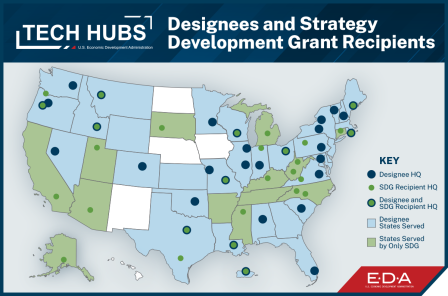The US Department of Commerce’s Economic Development Administration (EDA) Tech Hubs program is an effort by the federal government to help regions beyond Silicon Valley and Boston become global competitors as the US expands into high-tech manufacturing.
Back in July, as the deadline for applications for the Tech Hubs program drew near, Technical.ly talked to several technologists and economic development leaders about Delaware strategies for landing a tech hub designation — and whether the state should join a regional consortium or try to designate the state on its own.
The response across the board was that Delaware needs to be a collaborator, especially when it comes to Philadelphia.
Today, the Biden-Harris administration, through the EDA, announced that out of nearly 400 applicants, 31 Tech Hubs across 32 states had been selected, and Delaware is on the list — as part of the Greater Philadelphia Region Precision Medicine Tech Hub, led by the Ben Franklin Technology Partners of Southeastern PA.

This official designation concludes Phase 1 of the Tech Hubs program. In Phase 2, which effectively began as soon as the initial hubs were selected, the designees are now eligible to apply for strategy implementation funding from the CHIPS and Science Act. The US Department of Commerce has launched a Tech Hubs Notice of Funding Opportunity, allowing the 31 designated hubs to apply to receive between $40 million and $70 million each.
The local hub is designated as the Philadelphia-Camden-Wilmington region, covering parts of Pennsylvania, Delaware, New Jersey and Maryland. Its focus, life sciences, with a core technology area of end-to-end precision medicine, will bring together some of the region’s strengths, including biotechnology, medical technology, genomics, synthetic biology supported by artificial intelligence, machine learning and robotics, to develop new ways to treat and prevent disease and reduce health disparities.
Delaware leaders were quick to praise the selection of the Greater Philadelphia Region Precision Medicine Tech Hub.
“The capacity of Delaware and its regional partners to pave the way for the future of research and development, manufacturing, and innovation was just expanded to the largest scale imaginable,” Rep. Lisa Blunt Rochester said in a press release. “Today’s monumental announcement … underscores just how critical a role our region plays in building a powerful economy consisting of effective partnerships, innovative technologies, and good-paying, American jobs.”
Noah Olson, director of innovation for consortium member Delaware Prosperity Partners, said the designation brings “national validation” of the region’s life science prowess.
Selection “also allows us to spotlight our innovative culture and pursue additional resources that will help grow our regional ecosystem further,” he told Technical.ly via email. “Historically, Delaware has — on its own — been a cradle of innovation, particularly with developments and traction in the life sciences, such as in biopharmaceutical manufacturing and around cell and gene therapy. Delaware also has had the foresight to operate collaboratively, both statewide and regionally, recognizing that growth doesn’t happen in a vacuum or stop at state lines.
The impact is expected to go beyond members of the consortium, especially when it comes to jobs and workforce development.
“While the Tech Council of Delaware was not part of the Greater Philadelphia Region Precision Medicine Tech Hub application, we are thrilled that the greater Philadelphia area, which includes Delaware, has been designated by the Federal government as a Tech Hub,” said Zakiyyah Ali, executive director of the Tech Council of Delaware, in an email. “As a workforce intermediary, with over 30 corporate, education and training, and community members, we are uniquely positioned to leverage our sectoral partnership, First State Tech Partnership, to ensure the greater Philadelphia region is known for not just having a strong life sciences production capacity, but for also having a strong, diverse, and skilled tech workforce.”
In addition to the 31 designated Tech Hubs, the EDA also awarded 29 consortia with Strategy Development Grants intended to help those regions earn Tech Hub designation in the future.







